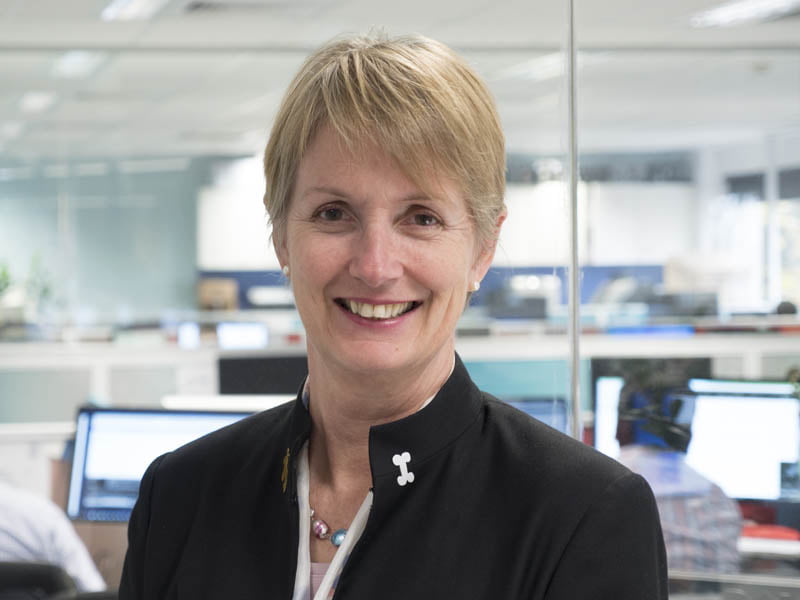Katherine Woodthorpe is a remarkable chairman: First, she’s a woman and secondly she’s a scientist – both remain rare at the apex of Australian corporate life.
A former CEO of Avcal, Australia’s venture capital lobby group, she is now chairman of Fishburners, chair of the National Climate Science Advisory Committee, and also chairs the HEARing CRC.
Dr Woodthorpe is as rare as hen’s teeth.

Katie Lahey, executive chairman of executive search firm Korn Ferry, says there are no official statistics tracking women chairmen in Australia – but runs her eye over the ASX Top 50 list for InnovationAus.com and identifies just three companies with a woman in the chairman’s role.
In 2015 research by Conrad Liveris suggested that there were just 24 companies in the ASX 500 with a woman chair.
Dr Woodthorpe is an even rarer bird. “My biggest handicap is that I’m a scientist and companies often dismiss my ability to add value.”
She said that in the past she’s been introduced by fellow board members; “In a slightly patronizing way – ‘she’s our scientist’, with the word ‘tame’ implied.”
It’s a flawed approach she said; “Scientists ask questions – why and how? That’s a really valuable trait on a board.” But she said that her science background coupled with the fact that she is female has made her career an “uphill battle” on occasion.
She remains adamant that more women are needed to take on senior leadership and particularly chairing roles in order to; “Bring something different, diversity – or group think sets in.”
“The role of the chair is that you are first among equals, or a ring leader. You need to hear views and bring consensus.”
And while the CEO sets the cultural tone for the organisation, Dr Woodthorpe noted that directors and chairmen often endure for longer periods, and so become the custodians of culture – and that includes the innovation culture of an organisation.
“You can’t have innovation when everything looks the same; if you don’t have different lived experiences; different work experiences,” she added.
Ms Lahey agreed; “The real issue in boards is to make sure you don’t have group think. The chairs and directors won’t be there every day so you need to canvas all points of view.
“If everyone thinks and looks the same and went to the same schools and unis what hope have you got of canvassing all areas?” and also fully understanding the issues that may be of concern to half your customer base.
Ms Lahey, who is also Chairman of the Tourism and Transport Forum, said that although there were a number of leading corporations with women chairmen – Catherine Livingstone at Commonwealth Bank, Catherine Brenner at AMP for example – they remained the exception.
Catherine Fox is one of Australia’s leading commentators on women and the workforce, and the author of the recently published book Stop Fixing Women. Ms Fox says that although it may be tempting to first focus on getting balance in the workforce, then in management, then in boards, before tacking balance at the chairman level – in fact all issues needed to be addressed simultaneously so that women were more fairly represented in all decision making roles.
She acknowledged that some organisations complained of “gender fatigue,” arguing that they had tried everything to get more women into the workforce and senior roles, to no avail.
“That’s one of the reasons I wrote the book, in fact they have tried very little and it’s all been remedial. And they have focused on supply rather than demand.”
From her vantage point as chairman of an executive search firm Ms Lahey said that there was enormous demand for women chairmen, but that there was only a small pool of potential female chairman candidates with management or board experience.
It is growing, thanks in part to the Australian Institute of Company Director’s target that 30 per cent of board positions be filled by women by 2018 – but still the supply outstrips demand.
Ms Fox argues that if there is demand, then organisations need to be more innovative about supply. As she notes in her book; “Sometimes the net needs to be thrown a little more widely to find the best candidates.”
OZ Minerals cast the net more widely with the appointment of Rebecca McGrath who later this month (May 17) becomes the first woman chairman of an ASX 100 listed miner.
Ms McGrath said that there was now good momentum in terms of appointing women onto boards, but remained concerned about the pipeline with women still under-represented in senior management roles. Until that pipeline was fixed, the size of the pool of women from which to draw board directors, and hence chairmen would remain constrained.
But she was optimistic that; “Australia’s business culture has got to a point where we no longer expect the chairman to be male and grey haired.” Organisations sought chairmen for particular purpose and; “They maybe need a different chairman with a different style and background if they want a different result.”
Ms McGrath said that at OZ Minerals after a turbulent period the organisation had sought a chair who could be nimble and spur the adoption of Agile practices. “I very much align with the possibility of taking a different approach and being people focused,” she said.
While mining remained an asset heavy sector she said that she would focus on competency, culture and the role of culture in driving performance in the organisation.
Do you know more? Contact James Riley via Email.

